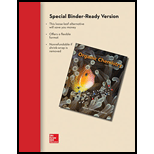
(a)
Interpretation: Advantages and/or disadvantages of using sodium hypochlorite for oxidation over
Concept introduction:
(b)
Interpretation: Advantages and/or disadvantages of using sodium hypochlorite for oxidation over
Concept introduction: Sodium hypochlorite is a green chemistry reagent for oxidation of alcohols as it avoids the usage of strong acids and also no carcinogenic metals are used. Sodium hypochlorite is also a green chemistry reagent for oxidation of alcohols as no carcinogenic metals are used.
Want to see the full answer?
Check out a sample textbook solution
Chapter 12 Solutions
Organic Chemistry (Looseleaf) - With Access
- In an analytical determination of arsenic, a solution containing arsenious acid, H3AsO3, potassium iodide, and a small amount of starch is electrolyzed. The electrolysis produces free iodine from iodide ion, and the iodine immediately oxidizes the arsenious acid to hydrogen arsenate ion, HAsO42. I2(aq)+H3AsO3(aq)+H2O(l)2I(aq)+HAsO42(aq)+4H+(aq) When the oxidation of arsenic is complete, the free iodine combines with the starch to give a deep blue color. If, during a particular run, it takes 65.4 s for a current of 10.5 mA to give an endpoint (indicated by the blue color), how many grams of arsenic are present in the solution?arrow_forwardCalcium metal can be obtained by the direct electrolysis of molten CaCl2, at a voltage of 3.2 V. (a) How many joules of electrical energy are required to obtain 12.0 1b of calcium? (b) What is the cost of the electrical energy obtained in (a) if electrical energy is sold at the rate of nine cents per kilowatt hour?arrow_forwardThe amount of sodium hypochlorite in a bleach solution can be determined by using a given volume of bleach to oxidize excess iodide ion to iodine; ClO- is reduced to Cl-. The amount of iodine produced by the redox reaction is determined by titration with sodium thiosulfate, Na2S2O3; I2 is reduced to I-. The sodium thiosulfate is oxidized to sodium tetrathionate, Na2S4O6. In this analysis, potassium iodide was added in excess to 5.00 mL of bleach (d=1.00g/cm3) . If 25.00 mL of 0.0700 M Na2S2O3 was required to reduce all the iodine produced by the bleach back to iodide, what is the mass percent of NaClO in the bleach?arrow_forward
- Using data in Appendix 1, estimate the temperature at which Fe2O3 can be reduced to iron, using hydrogen gas as a reducing agent (assume H2O(g) is the other product).arrow_forwardHydrazine, N2H4, has been proposed as the fuel in a fuel cell in which oxygen is the oxidizing agent. The reactions are N2H4(aq) + 4 OH(aq) N2(g) + 4 H2O() + 4e O2(g) + 2 H2O() + 4e 4 OH(aq) (a) Which reaction occurs at the anode and which at thecathode? (b) What is the overall cell reaction? (c) If the cell is to produce 0.50 A of current for 50.0 h, calculate what mass in grams of hydrazine must be present. (d) Calculate what mass (g) of O2 must be available to reactwith the mass of N2H4 determined in part (c).arrow_forwardBorazine, (BH)3(NH)3, is an analog of C6H6, benzene. It canbe prepared from the reaction of diborane with ammonia,with hydrogen as another product; or from lithium borohydrideand ammonium chloride, with lithium chlorideand hydrogen as the other products. (a) Write balancedchemical equations for the production of borazine usingboth synthetic methods. (b) Draw the Lewis dot structureof borazine. (c) How many grams of borazine can be preparedfrom 2.00 L of ammonia at STP, assuming diborane isin excess?arrow_forward
- Use oxidation numbers to show that the production of iron metal from its ore 1Fe2O32 by reaction with charcoal (C) is a redox reaction. Which reactant has been oxidized, and which has been reduced? Which reactant is the oxidizing agent, and which is the reducing agent?arrow_forwardWhat is the enthalpy value of the reaction 2Pd + O2 = 2PdO?When will Na2O be reduced by chrome?arrow_forwardNitric acid (HNO3) reacts with iodide ions (I-) to form iodine (I2) and nitrogen oxide (NO) in an acidic aqueous solution. Write the balanced equation for this reaction.arrow_forward
- Write a balanced equation for each of the following reactions:(a) preparation of white phosphorus from calciumphosphate, (b) hydrolysis of PBr3, (c) reduction of PBr3 toP4 in the gas phase, using H2.arrow_forwardHow much POCl3 can form from 25.0 g of PCl5 and the appropriate amount of H2O?arrow_forwardExplain reaction between SAE 304 stainless steel and isopropanol and why it may cause rust?arrow_forward
 Chemistry: Principles and ReactionsChemistryISBN:9781305079373Author:William L. Masterton, Cecile N. HurleyPublisher:Cengage Learning
Chemistry: Principles and ReactionsChemistryISBN:9781305079373Author:William L. Masterton, Cecile N. HurleyPublisher:Cengage Learning Chemistry: The Molecular ScienceChemistryISBN:9781285199047Author:John W. Moore, Conrad L. StanitskiPublisher:Cengage Learning
Chemistry: The Molecular ScienceChemistryISBN:9781285199047Author:John W. Moore, Conrad L. StanitskiPublisher:Cengage Learning General Chemistry - Standalone book (MindTap Cour...ChemistryISBN:9781305580343Author:Steven D. Gammon, Ebbing, Darrell Ebbing, Steven D., Darrell; Gammon, Darrell Ebbing; Steven D. Gammon, Darrell D.; Gammon, Ebbing; Steven D. Gammon; DarrellPublisher:Cengage Learning
General Chemistry - Standalone book (MindTap Cour...ChemistryISBN:9781305580343Author:Steven D. Gammon, Ebbing, Darrell Ebbing, Steven D., Darrell; Gammon, Darrell Ebbing; Steven D. Gammon, Darrell D.; Gammon, Ebbing; Steven D. Gammon; DarrellPublisher:Cengage Learning Chemistry & Chemical ReactivityChemistryISBN:9781337399074Author:John C. Kotz, Paul M. Treichel, John Townsend, David TreichelPublisher:Cengage Learning
Chemistry & Chemical ReactivityChemistryISBN:9781337399074Author:John C. Kotz, Paul M. Treichel, John Townsend, David TreichelPublisher:Cengage Learning Chemistry & Chemical ReactivityChemistryISBN:9781133949640Author:John C. Kotz, Paul M. Treichel, John Townsend, David TreichelPublisher:Cengage Learning
Chemistry & Chemical ReactivityChemistryISBN:9781133949640Author:John C. Kotz, Paul M. Treichel, John Townsend, David TreichelPublisher:Cengage Learning Chemistry: Principles and PracticeChemistryISBN:9780534420123Author:Daniel L. Reger, Scott R. Goode, David W. Ball, Edward MercerPublisher:Cengage Learning
Chemistry: Principles and PracticeChemistryISBN:9780534420123Author:Daniel L. Reger, Scott R. Goode, David W. Ball, Edward MercerPublisher:Cengage Learning





